Hi everyone! I am so excited to introduce you to a brand new contributor to the blog today, Larissa Crawford! Larissa is not only an amazing mom to her beautiful daughter Zyra, but she is also an anti-racism researcher and a policy advisor with over 13 years of experience. Larissa is the Founder of Future Ancestors Services, a youth-led professional services social enterprise that operates at the intersection of climate and racial justice. She is also proudly Métis and Jamaican. In honour of Black History Month, she is taking over the blog today to share her knowledge as it relates to Black History, race, and privilege, along with practical ways to have open discussions surrounding these topics with adults and kids.
Without further ado, I am honoured to welcome Larissa Crawford to the blog!
Let’s talk about talking about race, privilege, and Black History with children. Taanshi, I’m Larissa Crawford, a 27-year-old mother of a 5-year-old daughter, and I think about this a lot. In many ways it’s a big part of my work: for over 13 years I’ve been doing anti-racism and Indigenous research and education and while my practice remains informed by child and adult learning psychology, I’ve come to appreciate that I don’t need to drastically adjust my approaches to educating children to adults in anti-racism.
Because the skills of talking about and critically reflecting on race, privilege, and the living legacies of history is not something many people are explicitly taught in their youth. So when I’m working with most adults, I find it’s useful to bring us back to the fundamentals I cover in my work with children.
And yes, I said skills. Critical self-reflection is a skill. The capacity to talk about race is a skill. Being able to connect how what happened in the past shapes our realities today is a skill.
I love using the language of skill in this context because it underscores both the agency we have to practice and grow, and the kindness we can offer ourselves for not having these skills. For example, I’m not very financially literate, and I don’t mind acknowledging that I have a deficit in this skill. I grew up in extreme poverty, and trauma has informed my relationship to money. I also acknowledge that if I don’t invest in developing this skill now, I can cause financial harm to myself and those around me- so, I practice, read, and study. It’s a similar case with anti-racist skills, which for many reasons have not be prioritized in our education systems or media.
In this post, we’re going to explore some ways we can promote the development of the skills of talking about race, privilege, and Black History with children (and adults too).
In North America, Black History Month is wrapping up, and so consider this a timely support for ensuring the spirit and intention of Black History Month isn’t confined to the shortest month of the year.
#1 Keep a look out for binary good-bad thinking
Oftentimes racially-charged stereotypes become embedded in children’s truths of what is good, and what is bad. These truths inform not only our behaviour, but our understanding of self and others. The Clark Doll Experiments was a study conducted in the 1940s that illustrated just how young messaging about racial inferiority and superiority becomes ‘truth,’ and how it informed in this case African-American children’s internalized self-hate (Black = Bad) and idealization of Whiteness (White = Good).
I’ve seen this happen to my daughter as a consequence of the media she consumes, just last year.
I was working out with her and I had a 90’s workout playlist on. She kept asking me “Mummy, is this a bad guy singing?” and I’d say no and get back to my exercise. Then I clued in: she’s only asking this when Black men are rapping or singing. So I asked her, “Baby, why are you asking if these are bad guys singing?” and her response was “That’s what the bad guys sound like in movies, they sound bad.”
Yikes.
I then proceeded to have a discussion with her about ‘bad guys’ and ‘good guys,’ starting with this binary of ‘good’ and ‘bad.’ “You know baby, there are people that do bad things, and that doesn’t mean they’re bad people. And just because someone does something good, doesn’t mean they can’t do hurtful things too.” (When she’s in trouble, I reinforce this idea by telling her “you’re not a bad girl, but that was a hurtful thing to do.”)
We then talked about the media messaging: “Sometimes the people who make your movies and tv shows don’t think about what kind of message they’re giving little humans like you. That’s not your fault. But baby, you can’t assume someone is bad because their voice sounds a certain way (in this case, a Black man’s voice)…”
Had we not had this talk these stereotypes would become embedded deeper in her worldview, and would consequently inform her behaviour and actions. This happens to all of us. But I was able to catch and address this budding ‘truth’, and in doing so I’ve supported my daughter in being more critical of her good-bad binaries.
Put it into action:
- When you hear a child (or adult) express a good-bad binary, consider asking why they hold that belief. Critically reflect on your own binaries and where they come from, especially because this can help you explain why it’s so important to do so to others.
- Develop your own skills in critical media analysis, and pass these teachings on to your children. Canada’s Centre for Digital and Media Literacy has a great resource on Media Literacy
#2 Make sure they understand that it’s not luck, it’s privilege
Children who have access to clean water, shelter, food security, supportive family networks, intergenerational wealth, aren’t ‘lucky’, they’re privileged. Understanding what privilege is and that children aren’t just “lucky” can not only help these children be aware of their privilege, but it can also support the ones who face disproportionate barriers in understanding that it is not at a fault of their own that they aren’t “lucky.”
Some identities and experiences that can inform our privilege and the barriers we face:
- Race and the Colour of Skin
- Religion
- Intergenerational Wealth
- Food and Water Security
- Ability / Disability
- Languages Spoken
- Education
- Guardianship
- Geographic Location
- Appearance
- Citizenship as per the State
- Marital Status
- Age
- Gender
- Sexuality
- Communication and Learning Styles
It’s important that we challenge ourselves to destigmatize the word ‘privilege’ and to have honest conversations with children about the privilege they carry.
With my daughter, we regularly have these conversations using her privilege journal: we’ll go out to the mountains, or find a corner in her room, and we’ll talk about the things she has and why she has them. We’ll often start with me asking her, “Draw our house and what you love about our house,” and then I’ll proceed to explain why mummy can pay for this house and why she is privileged – not lucky – to live here.
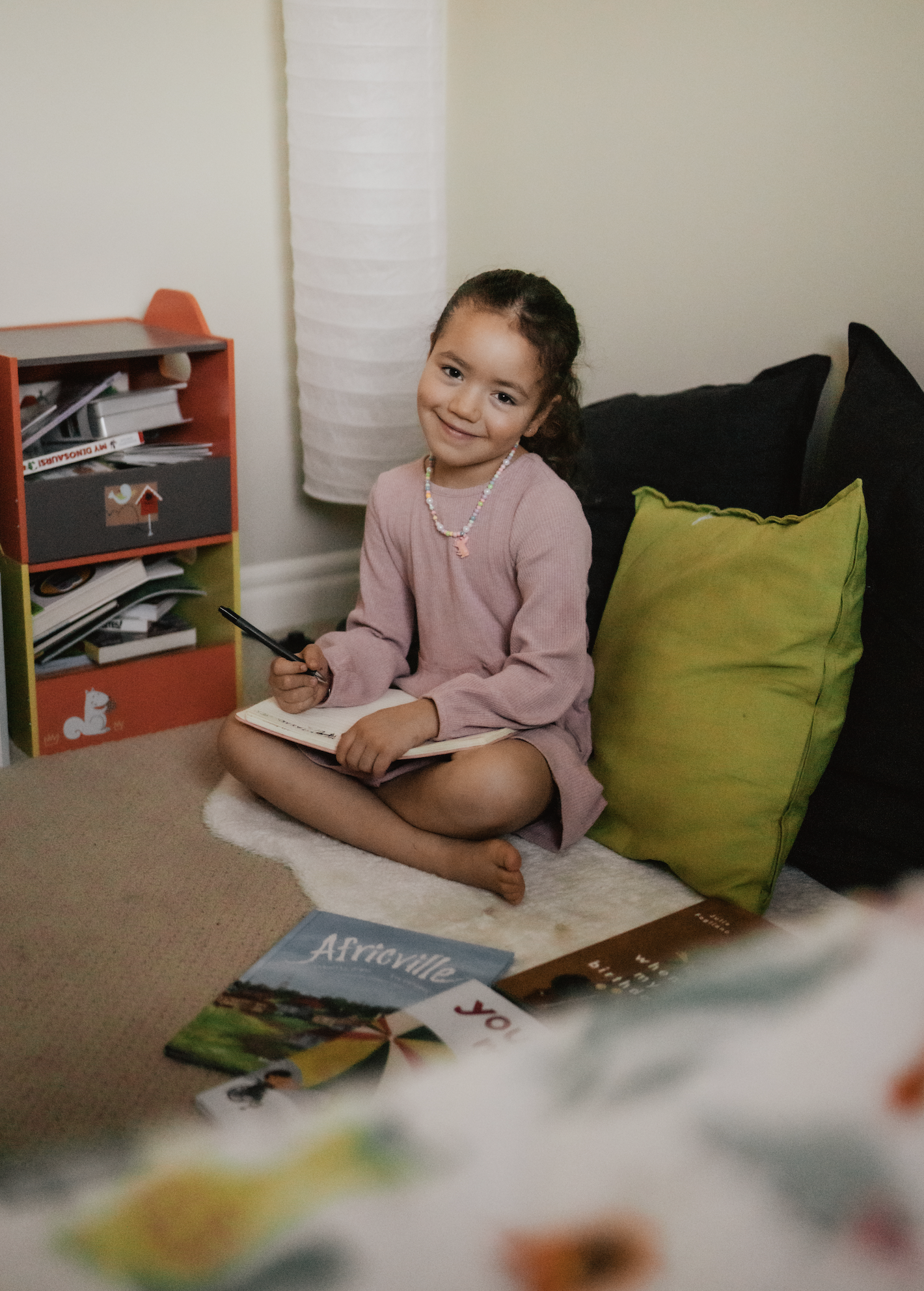
Being aware of our privilege does not require us to feel guilt for it. We – children inclusive – can experience a sense of empowerment and agency when we understand our privilege as an opportunity to enact anti-racist and sustainable change in ways that are unique to us.
Put it into action:
- Always emphasize that recognizing privilege is not to take away from one’s personal adversities. For example, someone who benefits from White privilege can still experience adversity. Recognizing privilege though, acknowledges that they will statistically have different access to support in overcoming that adversity, and that they likely weren’t experiencing that adversity because of how they are racially perceived (their skin colour).
- Avoid Oppression Olympics by emphasizing that not all privileges, and lack thereof, have the same impact. Someone who experiences a lack of privilege because of their gender does not have equal experiences to someone who lacks privilege because of their race. Someone who has privilege because of their education does not have equal experiences to someone who has privilege because of their able-bodiedness. Make this distinction early on. It can help by reflecting on how your own privileges impact you differently depending on the context, visibility, etc.
- Acknowledge the impact of intersecting privileges, and be clear that just because someone belongs to a group that experiences barriers, does not mean that everyone will experience those barriers the same way. For example, “Many of our family members, communities, and peoples have been hurt very badly and are hurt very badly, and sometimes things will be harder for us because of how people and spaces treat us [Indigenous people]. You also come from a long line of women in our family who have accessed universities! It will be easier for you to go to university if you choose, because of the money we’re saving and the support you’ll have from us. That is a privilege you have, but not everyone like us has that privilege. You can do something about that one day.”
- Holland Bloorview Kids Rehabilitation Hospital has put together the comprehensive Family Tipsheet: How to Talk to Your Child About Racism that has further resources and tips for speaking to children about race and privilege.
#3 Diversify your bookshelves and social media feeds
Our social media feeds are a daily way that our worldview is shaped; who we follow has no small impact, whether we want to admit that or not. There are actually entire bodies of research that explore how media shapes our worldview, like Cultivation Theory.
And the access children have to books are kind of like their social media feeds.
We’ve already talked about the importance of critical media analysis skills in #1: Keep a look out for binary good-bad thinking, but I believe the idea of diversifying our bookshelves and feeds is deserving of a section of its own – especially with regards to understanding history and our realities today.
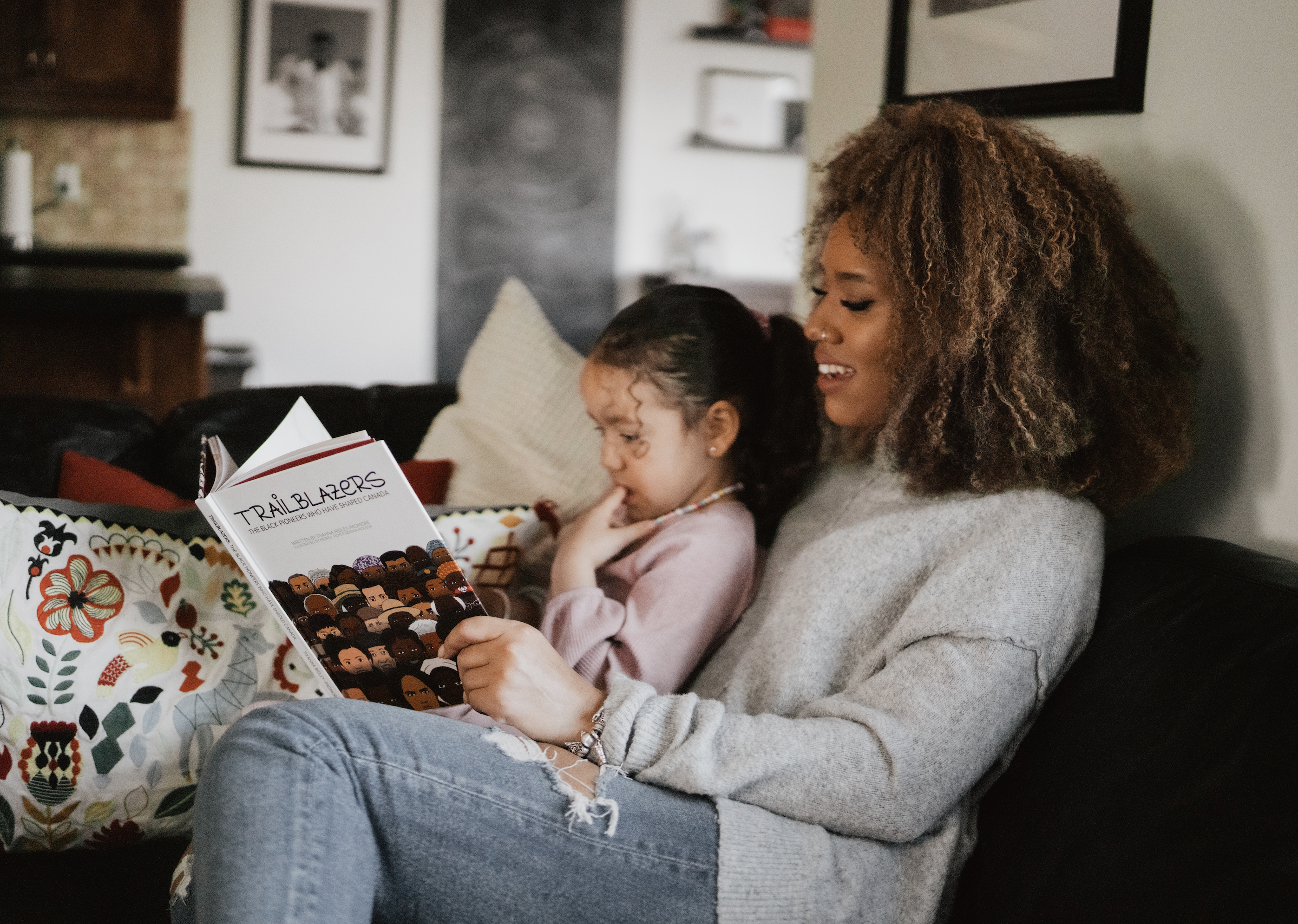
For example, one of my best friends and colleagues bought my daughter Trailblazers: The Black Pioneers Who Have Shaped Canada by Tiyahna Ridley-Padmore. We’ve read about one trailblazer every night for the past several months, and for each trailblazer we talk about how they’ve impacted our life today. Not only have we been able to address the gaps our education systems have intentionally created, but we’ve also been able to develop our appreciation for historical Black contributions (and not just trauma) to our lives today.
We can engage with history in so many ways, and when we do so with the purpose of seeking to understand “what does that mean for us today?” we’re building an essential skill of understanding historical causality – or ancestral accountability. When we seek to understand how the actions and inaction of ancestors (our personal ancestors, collective ancestors, ancestors of colonizers, ancestors of the original caregivers of the lands) have shaped our realities today, we are better positioned to appreciate how our actions and inactions are sharing our present and future realities. A key factor in building this skill is the information we have access to on a regular basis.
Put it into action:
- Integrate Black history into all facets of education, and don’t confine it to one section. It’s important we ‘walk the talk’ when we say we value Black history, and position Black people, culture, and traditional knowledge as being important in maths, sciences, health, social studies, etc. Edutopia published a great article on doing exactly this, Teaching Black History in Culturally Responsive Ways.
- Do a scan of your bookshelves and feeds. Some intersectional questions I like to ask myself when doing this are:
- Are frontline activists included and represented?
- Is there diversity in body shapes and sizes? Abilities and disabilities?
- How are Northern voices, realities, cultures, and people represented and considered?
- Are our children and Elders being celebrated?
- Are queer people involved?
- Is there space to celebrate Blackness?
- Does this contribute to a deeper understanding of diverse recounts of history?
Follow diverse educators on social media. Advancement Courses has also curated a list of 25 Black Teachers to Follow on Instagram, and Buzzfeed has put together 27 Black Canadians You Should Be Following On Social Media, which includes some of my favourites like Kathleen Newman-Bremang, Kayla Grey, Avery Francis, Adeela Carter, Amoye Henry, and Sasha Exeter.
Buy diverse books for children, especially ones that you will enjoy as well. Indigo has a great curated collection, An Antiracist Reading List for Kids, and New York Times curated a list, 14 Antiracist Books for Kids and Teens Recommended by BIPOC Teachers and Librarians. To take an additional step, try buying these books secondhand or from local and BIPOC-owned bookstores. You can find one near you using Second Story Press’ Black- and Indigenous-Owned Bookstores in Canada and the USA.
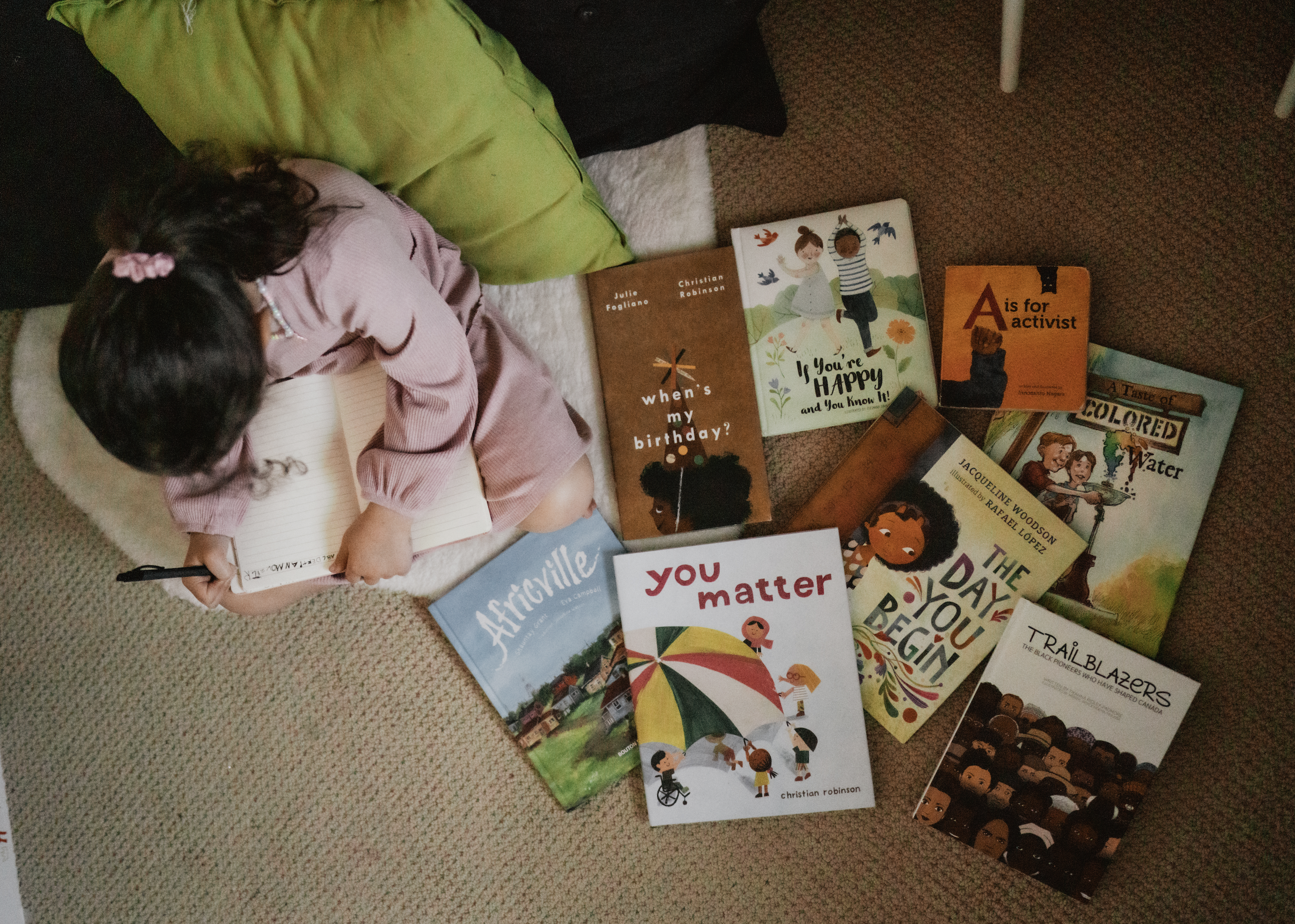
#4 Hold yourself and children accountable to practicing these skills year-round
The skills we explored in this post are becoming increasingly necessary as racial injustice bubbles to mainstream social consciousness, and as we seek to understand our role and place in all of it.
This post can be just that, a post. This post can also be your catalyst. Keep yourself accountable to some or all of the actions and ideas we touched on in this post. Save it, come back to it, and talk about it with your friends and family.
Now, as I mentioned, while I put these teachings into practice at home, this is also my work. I am the Founder and Managing Director of Future Ancestors Services, a youth-led professional services social enterprise that operates at the intersection of climate and racial justice. We deliver speaking, training, research, consulting and strategic planning, influencer, and language services to a wide range of clients through an amazing team of BIPOC experts who are majority disabled, queer, and young.
If you’re interested in learning more about the work I do and staying connected, you can do a few things:
- Check-out the Future Ancestors Services website to see if your client services are a fit for your workplace, social group/club, etc.
- Email service requests to [email protected].
Follow my personal Instagram, Twitter, and LinkedIn, and Future Ancestors Services Instagram and Twitter.
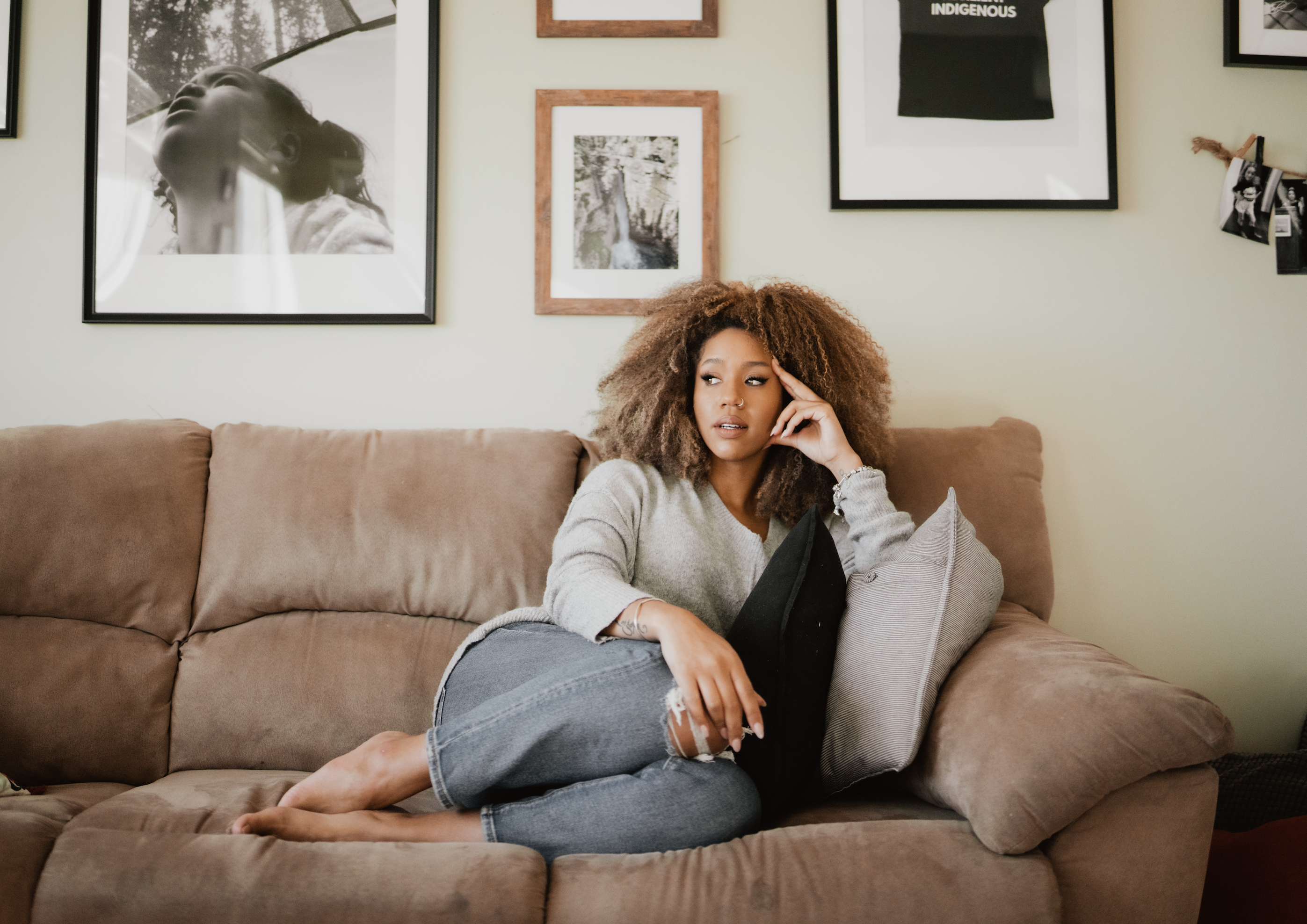
Ni miiyeuyhtayn aen kii kitootitaan, pi kwaayesh pishkaapahta,
XO
Larissa
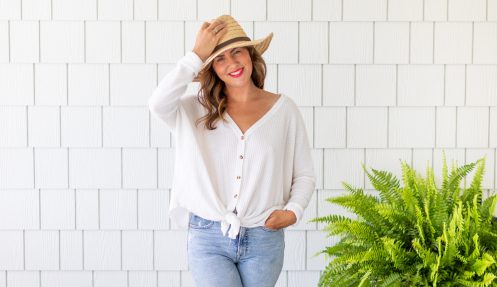
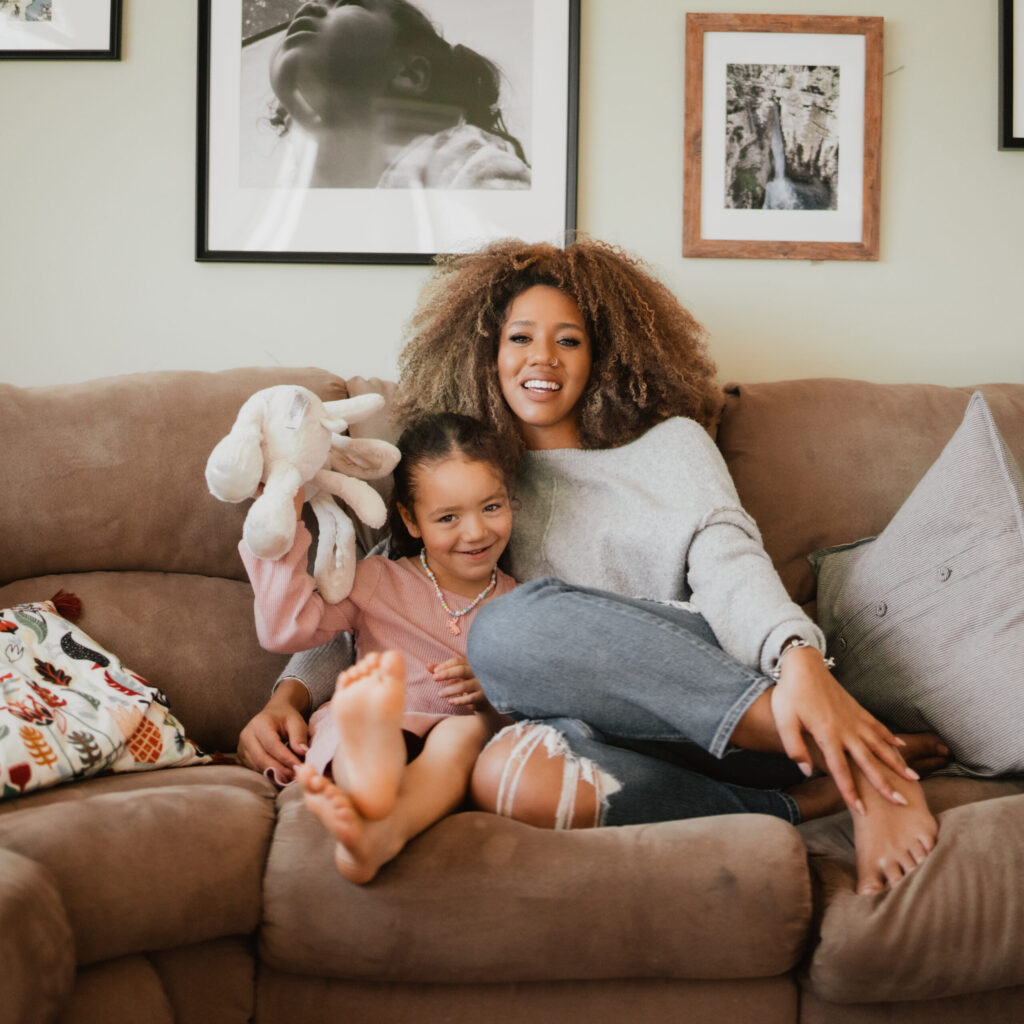
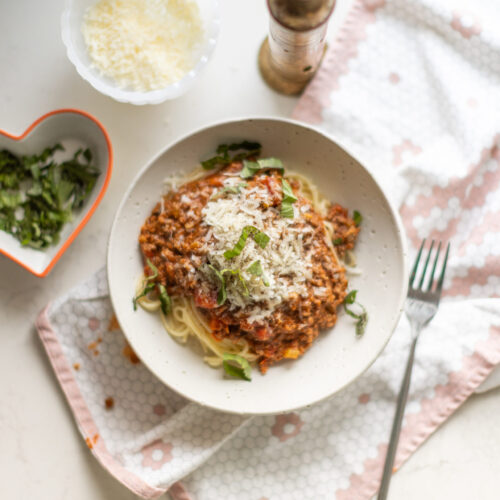

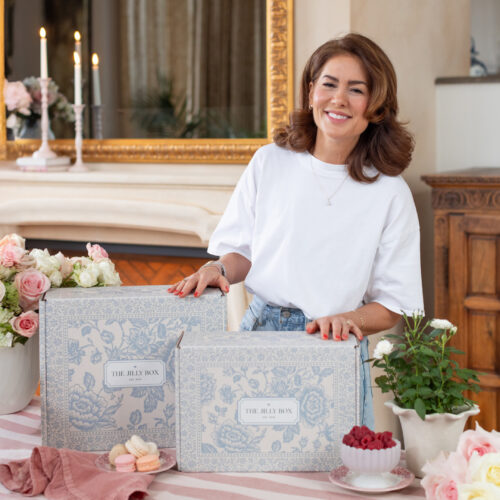
I really appreciated this post! As a teacher and a mother, I thank you for the tangible tips and resources provided in your post.